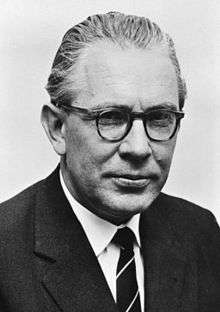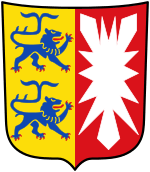Kai-Uwe von Hassel
| Kai-Uwe von Hassel | |
|---|---|
 Hassel in 1963 | |
| President of the Bundestag | |
|
In office 5 February 1969 – 13 December 1972 | |
| Preceded by | Eugen Gerstenmaier |
| Succeeded by | Annemarie Renger |
| Federal Minister of Defence | |
|
In office 9 January 1963 – 1 December 1966 | |
| Chancellor |
Konrad Adenauer Ludwig Erhard |
| Preceded by | Franz Josef Strauß |
| Succeeded by | Gerhard Schröder |
| Federal Minister for Displaced Persons, Refugees and War Victims | |
|
In office 1 December 1966 – 5 February 1969 | |
| Chancellor | Kurt Georg Kiesinger |
| Preceded by | Johann Baptist Gradl |
| Succeeded by | Heinrich Windelen |
| Minister President of Schleswig-Holstein | |
|
In office 11 October 1954 – 7 January 1963 | |
| Preceded by | Friedrich Wilhelm Lübke |
| Succeeded by | Helmut Lemke |
| Member of the Bundestag | |
|
In office 6 October 1953 – 4 November 1954 | |
|
In office 19 October 1965 – 4 November 1980 | |
| Personal details | |
| Born |
21 April 1913 Gare, Lushoto District, German East Africa |
| Died |
8 May 1997 (aged 84) Aachen, Germany |
| Nationality | German |
| Political party | Christian Democratic Union |
| Children |
Joachim von Hassel Barbara Weisse-von Hassel Jan von Hassel |
Kai-Uwe von Hassel (21 April 1913 – 8 May 1997) was a German politician from Schleswig-Holstein associated with the Christian Democratic Union (CDU). He served as Minister President of Schleswig-Holstein from 1954 to 1963, as Federal Minister of Defence from 1963 to 1966, and as Federal Minister for Displaced Persons, Refugees and War Victims from 1966 to 1969. From 1969 to 1972 he was the 4th President of the Bundestag.
Life and career
Hassel was born in Gare, German East Africa (now in Lushoto, Tanga Region, Tanzania), where his father Theodor von Hassel (1868–1935) had served as a Schutztruppe officer. After the First World War, the Hassel family was banished from Tanganyika by the British mandate administration and settled in Glücksburg, Schleswig-Holstein. Hassel took his Abitur school-leaving exam in 1933, trained as an agribusiness merchant, and returned to the Tanganyika Territory in 1935. At the beginning of the Second World War he was interned in Dar es Salaam by the British authorities and was again banished to Germany. Drafted into the Wehrmacht armed forces, he served as an interpreter for the Abwehr military intelligence organisation under Admiral Wilhelm Canaris and was decorated with the Iron Cross (2nd Class).
After the war, Hassel joined the newly established Christian Democrat party in the Flensburg district and from 1947 served as mayor of Glücksburg. In 1950 he became a member of the Schleswig-Holstein legislature, and at the 1953 federal election a member of the German Bundestag.
On 11 October 1954 Hassel assumed the office of a Minister-President of Schleswig-Holstein. From 1955-1956, he was President of the German Bundesrat. He was closely associated with Ludwig Erhard's two Chancellorships, serving as Minister of Defense from 16 October 1963 to 1 December 1966. He then served in Kurt Georg Kiesinger's Chancellorship from 1 December 1966 to 21 October 1969 as "Minister of Displaced Persons, Refugees, and War Victims". His son Joachim von Hassel, a naval aviator and Oberleutnant zur See, was killed in a Lockheed F-104 Starfighter crash on 10 March 1970.
Following his service in the government, Hassel was president of the Bundestag from 5 February 1969 to 13 December 1972, having been elected when the previous president, Eugen Gerstenmaier, resigned during a financial scandal. He died aged 84, when he suffered a heart attack during the Charlemagne Award ceremony in the Aachen city hall in 1997.
Sources
- Michael F. Feldkamp (ed.), Der Bundestagspräsident. Amt - Funktion - Person. 16. Wahlperiode, München 2007, ISBN 978-3-7892-8201-0
External links
| Wikimedia Commons has media related to Kai-Uwe von Hassel. |
| Political offices | ||
|---|---|---|
| Preceded by Franz Josef Strauß |
Federal Minister of Defence 1963 – 1966 |
Succeeded by Gerhard Schröder |

